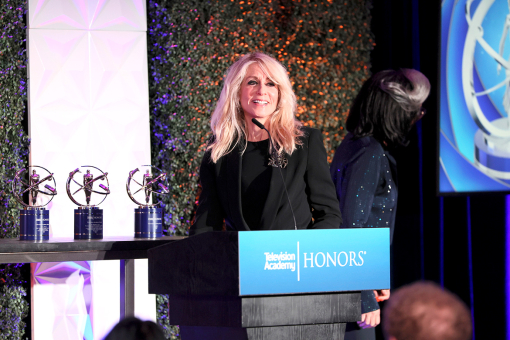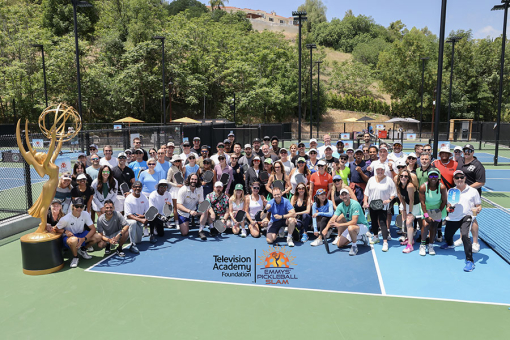The last embers have long since been extinguished from the wildfires that ravaged Southern California in January, but the searing effects of the blaze will be felt for years to come.
Helping entertainment industry members in the aftermath, the Television Academy donated $250,000 for wildfire relief to the Entertainment Community Fund. It also allocated another $125,000 to match Academy members’ Fund donations while establishing a list of resources for those who needed assistance or wished to donate.
"In those weeks following the wildfires, all of Los Angeles was, I think, in shock and at a standstill in doing business," says Foundation executive director Anne Vasquez. She and her husband had to evacuate their Altadena home quickly and, fortunately, were able to return to it. "It took some time for people to get back into the office and get back to having meetings that had to do with anything other than ‘How do we deal with recovery?’"
According to Vasquez, the Foundation dealt with recovery by having conversations about how to best use the resources at the Academy’s disposal, which led to the first standalone Emmys Pickleball Slam. (A smaller-scale, trial version was held in October 2024 in conjunction with the Foundation’s annual Emmys Golf Classic). The May 18 event, hosted by Phil Keoghan (The Amazing Race), raised $100,000; participants included firefighters, television and sports celebrities, industry executives, Academy leadership and members and pickleball pros.
Also, according to Vasquez, the Foundation "wanted to find a way to acknowledge the devastation and to partner with an organization that could benefit from the support of such an event." That organization would turn out to be the nonprofit Widows, Orphans & Disabled Firefighter's Fund (WODFF) and its Wildfire Fund, which distributes donations to firefighter families affected by the fires. In late January, Vasquez met with a WODFF representative at a fundraising event in support of the LAFD Foundation. Her conversation with that representative proved to be a formative one.
"These firefighters are trying to save other people's homes while their own homes were being ravaged — or they were otherwise being directly impacted by the wildfires," Vasquez says. "It was personally important that the Television Academy Foundation do something to acknowledge what [the firefighters] did for the community, to acknowledge their work and sacrifice."
Separately, Foundation Vice Chair John Pollak spearheaded an effort (in partnership with Louis Dargenzio) to help those who had lost their homes and possessions.
"One of our first calls was to Cris Abrego," says Pollak. Before beginning his first term as Television Academy chair in 2024, Abrego held the position of Foundation chair. Pollack recalls: "I said [to Abrego], 'You have such an extensive reach into entertainment. You know everybody, so this is what we're trying to do. Can you help?' And the Academy was instrumental in making connections we might not have had, and helping bridge some of the gaps. They played a very pivotal role in helping us get to the right people."

Louis Dargenzio / Photo credit: Zello Group
Pollak, a veteran television development and distribution executive, is currently the CEO and co-founder of the Latino-focused management company Allied MGMT Group. He teamed up with Dargenzio, founder of the recently established Zello Group, and others to help launch Dargenzio’s inspired idea: Use entertainment industry resources to create a program that could supply furniture and other items to those needing to establish interim housing until they could once again have a permanent residence.
Dargenzio — who had previously provided resources to people affected by the Covid pandemic — organized what became a four-hour Zoom meeting with entertainment industry colleagues to brainstorm how the program, Zello Support, would work. He had conceived the idea after learning that one of his own employees’ family had lost their Altadena home. (This employee’s daughter had also lost their school in the fires).
"I get to bed and I'm like, ‘Wow, I'm exhausted, but this is just one family,’" Dargenzio recalls. “There are 18,000 structures gone: How can we help?"
Within 24 hours of his distraught employee’s phone call informing Dargenzio of her situation, he sprang into action. By that night, he had moved the family into an apartment — one complete with furniture, clothing, food and toys that he and others had purchased that day.
Soon, Dargenzio and his Zello team called upon their industry connections and relationships to assist their community. They recruited studios and prop houses to donate furnishings. They enlisted set designers and decorators to help individuals, couples and families choose the right items for their needs, with Teamsters transporting the goods to their respective new addresses. In addition to appealing for monetary donations, Zello Support also put out a request for volunteers to help with various tasks while securing storage space for those who did not yet have a place to furnish.
At the time, Dargenzio happened to be closing escrow on the purchase of a former bank building in Burbank, across the street from Warner Bros. Studios. He postponed using the space as headquarters for the Zello Group — which creates content, builds companies and invests in real estate — to instead utilize it as Zello Support’s showroom headquarters.
Zello Support ran for 12 weeks, from mid-January to early April, filling more than 1,000 homes. Among the many who benefited is Johnny Agnew, a driver who counts Halle Berry, John C. Reilly and many set dressers among his clients. He and partner Yipsy lost not only their Altadena home, but the extensive collection of vintage trailers, cars, signs and other items for which his Funky Junk Farms had been noted.
"Most people in my part of Altadena thought we were coming home," says Agnew, whose credits include Unfrosted and Winning Time. "We thought we were leaving for the night. There was no preparation, no warning, nothing. To say Zello Support was very helpful would be an understatement."
Providing such help could, at times, feel overwhelming for volunteers, acknowledges set decorator Dorit Hurst (Ballard, On Call), chairperson of the Set Decorators Society of America’s community outreach committee. Hurst helped organize the furnishings that were donated and guided people through the selection process.
"What we didn't foresee was the amount of people coming in [dealing with] their grief about lost furnishings. Items that were maybe handed down through generations, or maybe it was something brand new that they had saved up money for," Hurst says. "So the decorators that were on these appointments were really holding a lot of space for listening to [people’s] stories, helping them process and then helping them move forward."
Hurst also witnessed gratitude and joy. "Seeing the entertainment community, volunteers and peripheral people all coming together — people donating from all walks of life to help the community at large — is so heart-expanding."
Dargenzio himself is grateful to all who contributed. He also appreciates Zello Support founders such as Pollak, who, he says, showed up every day.
"What was so awesome is that we proved to the world that, when you get really talented people together and remove the red tape, magic happens," he says. "And it happens really fast."











